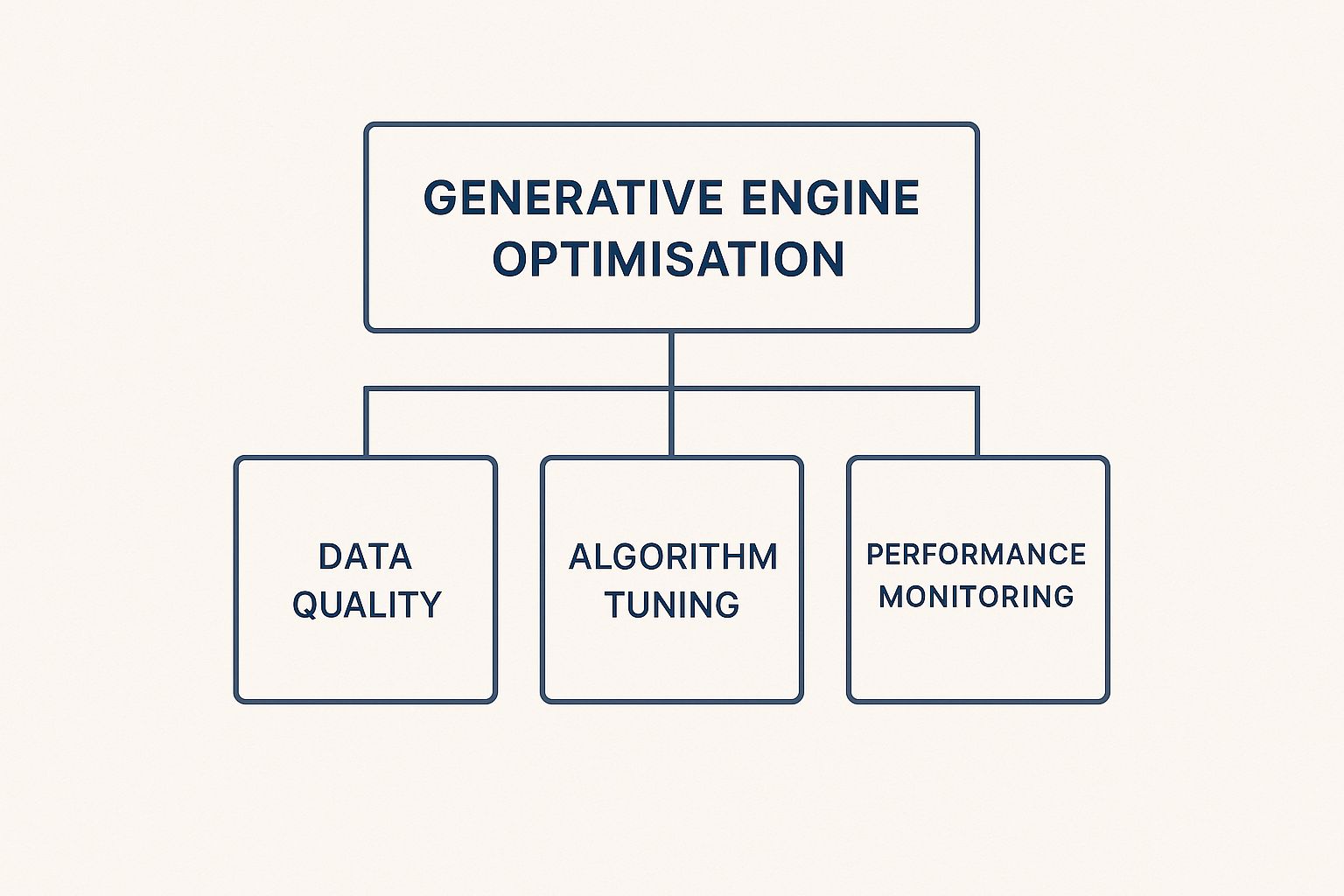Here's the simple truth: Generative engine optimisation services are what come after traditional SEO. It’s a new approach designed to make your brand the trusted source for answers within AI tools like ChatGPT and Gemini, rather than just another blue link on a search results page.
Understanding Generative Engine Optimisation

Search is changing. For decades, Search Engine Optimisation (SEO) was all about climbing the ranks to get your website high up in a list of links. You'd do your research, click a link, and find the information you needed on that webpage.
But Generative Engine Optimisation, or GEO, is built for a fundamental shift in how people find information today.
From a Library Catalogue to an Expert Librarian
Think of traditional search like a library's old-school catalogue system. You look up a topic, and it points you to a list of books (websites) where you might find the answer. You still have to do the legwork—go to the shelf, pull out the book, and read it yourself.
Generative search, on the other hand, is like asking an expert librarian. You ask your question, and the librarian (the AI) consults the best, most reliable books in the library to give you a single, comprehensive answer.
GEO is the process of making sure your brand's "book" is seen as the most credible and authoritative source for that librarian to use.
This evolution is something businesses absolutely cannot ignore. User expectations are moving towards instant, conversational AI responses, and brands that fail to adapt risk becoming completely invisible.
Why This Is a Fundamental Shift for Your Business
The rise of AI-powered search isn't just a minor update; it represents an entirely new way for customers to find solutions. When your brand becomes the source of an AI's answer, it builds immense trust and authority.
This shift has kickstarted a proactive response in the digital marketing world. Since ChatGPT arrived on the scene in 2022, the Australian market has seen a rapid uptake of AI-driven search. In response, specialised generative engine optimisation services have been developed to help local brands get found not just on search engines, but within them.
The goal is no longer just to be discoverable. It's to become the definitive answer. A successful GEO strategy ensures your expertise is featured directly in the AI's response, establishing your authority at the most critical point of the user's journey.
To adapt to this new reality, it's crucial to understand the different strategies required. You might be interested in learning more about our dedicated https://titanblue.com.au/our-services/generative-engine-optimisation/ that are designed for this new era of search.
Why Your Business Must Adapt to AI Search

The way customers find information online is changing in a big way. We’re moving from a simple list of blue links to direct, conversational answers. This isn't some far-off prediction; it's happening right now, and it's completely rewriting the rulebook for how businesses get found online.
For years, the game was all about earning a click. Now, generative AI gives users a neat summary right on the results page, often meaning they never have to visit your website at all. If you're still relying only on traditional SEO, you're running the risk of becoming invisible.
Being left out of these AI-generated answers is the new equivalent of being removed from Google entirely. It's not just a missed opportunity—it's a direct threat to your online survival.
This is exactly why adopting generative engine optimisation services isn't just a nice-to-have upgrade. It's a critical step to stay competitive and, frankly, stay in business.
The New Reality of User Behaviour
The data doesn't lie: people are flocking to this new way of finding information. This trend is especially strong here in Australia, which has quickly become one of the most AI-savvy nations on the planet.
Staggering new figures show that a massive 38 million AI-powered searches are now made every single month in Australia using tools like ChatGPT and Google Gemini. With around 10% of all Australian search queries now showing AI-generated summaries, the shift in user behaviour is clear and presents a direct challenge to old-school SEO.
This rapid adoption means that if your business isn't set up to be a trusted source for these AI engines, you're already missing out on a huge and growing chunk of your audience. The question is no longer if you should adapt, but how fast you can.
The Risk of Inaction
Sitting back and doing nothing has real, damaging consequences. Your brand's voice gets drowned out, your expertise is ignored, and your connection with potential customers is cut off before it even has a chance to start.
Think about the risks of standing still:
- Loss of Visibility: If your content isn’t structured for AI, your competitors who are will grab your audience’s attention first. It's that simple.
- Erosion of Authority: When AI doesn't cite you as a source, your brand's credibility and authority slowly fade away.
- Decreased Web Traffic: As more people get answers without clicking, your website traffic will drop. This directly impacts leads and sales. For local businesses, this can be devastating, highlighting just why local SEO is important as a piece of the complete puzzle.
To get a handle on the wider impact of AI and the urgent need to adapt, checking out resources like a practical guide to AI for agencies can offer some valuable perspective. Ultimately, doing nothing isn't a neutral choice; it's a decision to get left behind.
Alright, let's get into the nitty-gritty of what a Generative Engine Optimisation (GEO) strategy actually looks like. We've talked about the 'why', but the 'how' is where the real work begins. A strong GEO plan is built on a few key pillars—these are the practical steps that generative engine optimisation services use to get your brand featured in AI-generated answers and position you as a go-to source.
At its core, GEO is all about making sure AI models can easily understand and, more importantly, trust your expertise. This means your content needs to be exceptionally high-quality, factually accurate, and well-organised so these systems can make sense of it without any confusion. If an AI can't verify your facts or figure out what you're trying to say, it'll just move on to the next source.
This infographic gives a great overview of the main focus areas for a solid GEO strategy.

As you can see, success really comes down to a blend of top-notch data, staying aligned with how algorithms are evolving, and keeping a close eye on your performance.
Building Your Brand as a Trusted Entity
First things first, you need to establish your brand as a recognised authority. This is more than just getting your name out there. It’s about creating a consistent digital footprint where all your business details—name, address, phone number, services—are identical everywhere, from your website to local directories.
This consistency helps AI models build a clear, unified profile of your business, which in turn builds trust. Any conflicting information creates doubt, and that’s the fastest way to get overlooked.
Think of it like this: GEO requires you to build a digital resume for your business. The more consistent and factually accurate that resume is, the more trustworthy you'll appear to an AI.
Creating High-Quality, AI-Friendly Content
Content is the fuel for any good GEO campaign. The game has changed, though. It’s no longer just about stuffing keywords into a page; it’s about answering questions thoroughly and factually. A major part of an effective GEO strategy is using artificial intelligence to create and fine-tune content that AI search models will love. For businesses keen to get started, there are some great guides on using AI for content creation that offer a solid starting point.
Here are the core content strategies for GEO:
- Answering Conversational Questions: Optimise for long-tail, conversational queries that sound like how real people talk. Instead of just "law firm structures," think "what are the best business structures for a new law firm?"
- Demonstrating Expertise: Create in-depth guides, detailed FAQs, and articles backed by data that truly show you know your stuff. Shallow, generic content gets completely ignored by AI.
- Ensuring Factual Accuracy: Every claim you make needs to be verifiable. Citing your sources and linking out to other authoritative pages helps AI models confirm that your information is legit.
Leveraging Advanced Technical Signals
Finally, a solid GEO strategy depends on some clever technical work to communicate clearly with AI. These are the behind-the-scenes signals that make your content easy for a machine to read and understand.
One of the most powerful tools for this is structured data, also known as Schema markup. This code essentially acts like a set of labels for the AI, explicitly telling it what key pieces of information on your page are, such as who wrote the article, your business's opening hours, or details about a specific product or service.
By clearly labelling your content, you take the guesswork out of it for the AI and make it much easier for it to pull your information into its answers. For businesses on the Gold Coast, this technical precision is a crucial part of effective answer engine optimisation, helping you stand out in a busy local market.
How to Measure Success in Generative Search

When you invest in any new marketing strategy, you need a clear way to see if it's actually working. Generative Engine Optimisation (GEO) is no different. The catch is, measuring success here isn't quite like tracking your usual SEO metrics.
While keyword rankings still matter, the real measure of success in the world of generative search is all about how well your brand is shaping AI-powered conversations. It's a completely different ball game.
Instead of the familiar territory of blue links and domain authority, we’re now looking at more subtle, yet powerful, key performance indicators (KPIs). The big question is no longer "How high did we rank?" but rather, "Did the AI chatbot trust our brand enough to use us as a source?" This shift gives us a much clearer picture of your brand's authority and influence in this new AI-driven era.
The businesses that jumped on generative engine optimisation services early are already reporting some impressive, concrete results, proving that GEO isn't just a buzzword—it's a strategy that delivers real, quantifiable business outcomes.
Defining the New KPIs for GEO
To really get a handle on how your GEO efforts are paying off, you need to start tracking a fresh set of metrics. These new KPIs are all about your brand's visibility and reputation inside AI-generated answers.
Here are the main things you should be keeping an eye on:
- Brand Mentions and Citations: This is your most direct feedback loop. It counts how often your brand, your products, or even your key people are named or cited as a trusted source in AI responses to relevant questions.
- Share of Voice in AI: Think of this as your market share within AI conversations. It measures how often your brand appears in AI answers compared to your competitors, giving you a clear snapshot of where you stand in the industry.
- Sentiment Analysis: It’s not enough to just get mentioned; you need to know how you're being talked about. This involves analysing the tone of AI-generated summaries that feature your brand, making sure the sentiment is positive and puts you in a good light.
Tracking Tangible Business Outcomes
Ultimately, these new metrics have to tie back to what really matters: your bottom line. The end goal is to connect the dots between interactions driven by generative AI and actual conversions and revenue, proving a clear return on your investment. You can get more insights on tracking these kinds of results by exploring different ways of boosting your rankings across various platforms.
Feedback from Australian businesses already tells a compelling story. Local firms offering specialised GEO services are seeing some serious, measurable impacts on both traffic and ROI. For example, some have reported a 27% average increase in organic traffic for their clients. In other, more targeted campaigns, the results have been staggering, with a remarkable 3000% return on investment.
These numbers aren't just vanity metrics; they show that a smart GEO strategy drives high-intent traffic and quality leads, giving businesses the confidence they need to invest. You can see more about these powerful client results on Clutch.co.
Choosing the Right GEO Service Partner
As Generative Engine Optimisation (GEO) shifts from a niche idea to a core business strategy, picking the right partner to guide you is more crucial than ever. A poor choice can lead to a wasted budget and missed opportunities, but the right one can cement your brand’s place in the future of search.
Hiring a provider for generative engine optimisation services isn't like finding a traditional SEO agency. You need a partner who gets this new field on a much deeper level. That means looking for a team that can prove they understand the mechanics of Large Language Models (LLMs) and have a clear, documented process that goes well beyond standard search practices.
A truly competent GEO partner focuses on two things above all else: content integrity and data accuracy. They know that to become a trusted source for AI, your information has to be flawless and your brand identity consistent everywhere online.
Key Questions to Ask Potential Partners
Before you sign on the dotted line, you need to properly vet any potential agency to make sure they have the skills to navigate this new landscape. Their answers to a few direct questions will quickly reveal their true capabilities.
First, ask about their reporting process. A real expert can show you exactly how they track and measure GEO-specific metrics, like brand mentions in AI responses and your share of voice within AI conversations. If their answer is all about traditional keyword rankings, it’s a massive red flag.
Next, get into the nitty-gritty of their content optimisation methods. Ask them to walk you through their exact process for making existing content AI-friendly and for creating new assets designed specifically for generative engines. They should be able to explain how they structure information, verify facts, and build the authority signals that AI models recognise and trust.
A critical sign of a capable GEO partner is their ability to show, not just tell. Ask for real-world case studies or examples of clients they have successfully positioned within AI-generated answers. Proof of past success is the best indicator of future performance.
Essential Criteria for Your Decision
Making the right choice comes down to focusing on a few non-negotiable criteria. Use this checklist to size up your options:
- Proven GEO Methodology: Look for a clearly defined strategy that goes beyond SEO basics. They should have a dedicated approach for entity optimisation, factual verification, and smart content structuring.
- Deep LLM Understanding: The agency must show a solid grasp of how AI models like Gemini and ChatGPT gather, process, and present information.
- Focus on Data and Integrity: A top-tier partner will be obsessed with data accuracy, making sure your brand’s information is consistent everywhere it appears online.
- Transparent Reporting: They should provide clear, actionable reports on GEO-specific KPIs, linking their efforts directly to your business goals.
At the end of the day, your digital presence is a complex machine with many moving parts. A strong GEO strategy should work hand-in-hand with your other digital marketing, like a well-managed campaign for social media management on the Gold Coast, to create a unified and powerful brand voice. By asking the right questions and focusing on these key criteria, you can find a partner who will expertly guide you through this new era of search.
Common Questions About Generative Engine Optimisation
As generative engine optimisation starts popping up in business conversations, a lot of good questions are coming with it. This is a new way of thinking about online visibility, so it’s natural to want to get your head around the details. Let's tackle some of the most common queries to show you exactly how it works and who it’s for.
Getting these fundamentals right is the key to understanding why investing in generative engine optimisation services is such a smart move for any brand looking to grow.
Does Generative Engine Optimisation Replace Traditional SEO?
Not at all. Think of it this way: traditional SEO is the essential foundation of your house. It needs to be solid, fast, and built on good ground with strong authority signals. You simply can't build a great house without a solid foundation.
GEO is the next layer you build on top of that. It’s the architectural design, the interior layout, and the smart-home features that make your house the most useful and trusted one on the street. SEO gets you found by search engines, while GEO positions you as the expert an AI trusts enough to give a direct answer.
A complete digital strategy needs both working together. You still need that strong SEO base for AI models to find, crawl, and ultimately trust your content enough to use it.
How Long Until We See Results From GEO Services?
The timeline for seeing real results from GEO can vary. It really depends on things like how competitive your industry is, the digital authority your brand already has, and the quality of your existing content. GEO is a long-term game; it’s all about building deep trust with AI models, and that doesn't happen overnight.
Generally, you can expect to see the first signs of progress within three to six months. This might look like your brand getting mentioned or cited in AI-generated answers for specific questions. But for the more solid, consistent results that turn into actual traffic and leads, you’re typically looking at six to twelve months of focused, ongoing work.
What Type of Content Performs Best for GEO?
Content that is incredibly clear, factual, well-organised, and shows off genuine expertise is what performs best for GEO. AI models are wired to prioritise accuracy and authority above everything else. This means a few types of content are particularly effective:
- Comprehensive Guides: Deep-dive articles that explore a topic from every angle, leaving no stone unturned.
- Detailed FAQ Pages: Content that directly answers common questions in a simple, easy-to-scan format.
- Data-Backed Articles: Posts that are packed with stats, cite reputable sources, and present facts you can verify.
Using structured data (like Schema markup) to clearly label key bits of information—like who the author is, details about your organisation, and specific facts—is also a game-changer. The goal is to make it as easy as possible for an AI to understand, verify, and feel confident using your content in its answers.
Is GEO Only for Large Corporations?
Absolutely not. While big companies with well-known brands might have a head start, GEO opens up a huge opportunity for small and medium-sized businesses (SMBs). By zeroing in on a specific niche and creating the absolute best, most expert-driven content out there, an SMB can become the go-to source for AI models in its field.
GEO helps level the playing field because it values the quality and accuracy of your content more than the sheer size of your website. A local business that gives the best, most reliable answer to a local question can get featured by an AI over a much larger, more generic national company.
Ready to secure your brand's place in the future of search? At Titan Blue Australia, we have over 25 years of experience helping businesses thrive online. We specialise in AI search and content strategies that ensure you are found not just on search engines, but within them. Get in touch with us today to discuss how our generative engine optimisation services can help your business grow.
Learn more at https://titanblue.com.au.




